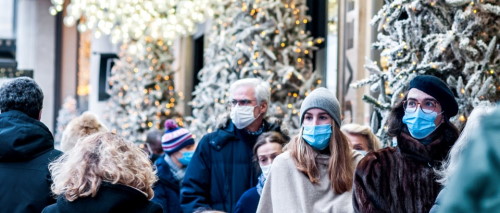With new information about Omicron emerging every day, scientists are understanding more about how the new Covid-19 variant spreads—and what this means for you.
The newest Covid-19 variant: Omicron
The Omicron variant is another pivotal unfolding in the two-year Covid-19 saga, with scientists having first identified the variant in South Africa at the end of November.
Since then, Omicron has traveled to numerous countries around the world, as well as about 20 U. S. states, according to the Centers for Disease Control and Prevention (CDC).
BREAKING: Doctors Can't Believe She Used This To Erase Her Wrinkles...
Omicron is so new that researchers are working swiftly to decipher its behavior and what that means for humans, as S. Wesley Long, MD, PhD, medical director of diagnostic microbiology at Houston Methodist, tells TheHealthy.
Research is ongoing—here’s the picture we have so far.
Omicron has more mutations than other variants
Every time a virus replicates, it can take on mutations that make it different from earlier versions of the same virus.
Omicron has many more of these mutations than other variants we’ve seen, says Robert Glatter, MD, an emergency physician with Lenox Hill Hospital in New York City.
Specifically, Dr. Glatter says, at the time of this article’s publication, there are at least 30 mutations in Omicron’s spike protein. (The “spike protein” is the area on the virus which enables it to invade cells.)
Researchers haven’t determined how Omicron came about, although the mutation may have occurred when Covid-19 lingered for an unusually long period of time within an individual patient. “It was smoldering along, constantly multiplying with opportunities for mutations to occur,” says William Schaffner, MD, an infectious diseases specialist at Vanderbilt University Medical Center in Nashville.
Dr. Schaffner explains why mutations in the spike protein are particularly concerning: “The spike protein is [like] the key that goes into the lock of the cell which allows the virus to enter and begin multiplying,” he says. This could affect how easily the variant spreads.
Omicron may spread more easily than other Covid-19 strains
Early indications suggest Omicron may be more transmissible than even the Delta variant, which itself was far more transmissible than its predecessors.
“The data are fragmentary, but this does appear to be a highly contagious variant,” says Dr. Schaffner. Omicron is easily as contagious as Delta and perhaps even more so, he explains, adding: “If there were a footrace between the two, Omicron may actually outrun Delta.”
For the time being, Delta is still dominant… but, that could change.
Omicron may cause milder illness
The jury is still out on whether Omicron causes more or less severe disease than other variants.
So far, Dr. Glatter says, hospitalizations are quite low and it appears to be less severe than the Delta variant—though this varies from country to country and is challenging to gauge, given the use of different vaccines and varying vaccination rates around the world.
Adding to the uncertainty about Omicron’s severity is the idea that the earliest reports of Omicron were in young adults, who, in general, tend to fare better with Covid-19 than older populations.
We don’t know the exact death rate for Covid, as these data typically lag behind other indicators, like hospitalizations.
Also, data is lacking on reinfection rates among people with prior infections, as well as vaccinated people.
Many individuals with Covid have experienced only mild symptoms, while others have shown no recognizable symptoms at all, according to Dr. Schaffner.
(While this may be true, remember that Covid-19 has already led to 800,000 deaths in the United States alone, according to John Hopkins University.)
Omicron symptoms seem to be similar
There’s nothing to indicate that symptoms of Omicron are any different from symptoms of other variants, according to the World Health Organization.
Similar to other Covid-19 infections, Omicron symptoms may include fever or chills, a cough, trouble breathing, fatigue, muscle aches, headaches, loss of taste or smell, a sore throat, nausea, vomiting, or diarrhea.
How to protect yourself against the Omicron Covid-19 variant
The three vaccines currently offered in the United States—Pfizer/BioNTech, Moderna, and Johnson & Johnson—should be at least somewhat effective against Omicron.
“[…T]here may be adequate cross-protection with the variants as long as you’re fully vaccinated, which now means three doses,” says Dr. Glatter. However, the current data is limited.
Offering greater reassurance, a report from Pfizer/BioNTech says that three doses of its shot provides significant protection against Omicron.
(It’s important to note that the pharmaceutical giant added the Omicron variant may require a fourth jab 12 months after the booster. Expect to hear more on this.)
Some treatments against Omicron may be effective
The CDC says the genetic composition of Omicron does suggest that at least some existing Covid-19 treatments will be effective to treat patients with this strain.
For mild cases of Covid-19, treatment may consist of pain relievers, fluids, and rest. More severe cases may warrant outpatient monoclonal antibodies to boost the patient’s immune response.
Hospitalized patients may receive monoclonal antibodies in addition to medications, such as remdesivir (an antiviral medication) and steroids.
Also, pharmaceutical companies are making progress with the first medications to treat Covid-19 in specific. The U.S. Food and Drug Adminisitration has just approved two new pills which seem to be highly effective.
Merck’s molnupiravir purportedly cuts the risk of being hospitalized and dying of the virus by 30 percent, as long as it’s administered within five days of symptoms appearing.
Meanwhile Pfizer has developed paxlovid, which may cut the risk of hospitalization and death by almost 90 percent if it’s administered within the first three days of noticeable symptoms, according to current research.
The best way to prevent Omicron infection: The Covid-19 vaccine
“While we are preoccupied with Omicron, the vaccines do prevent Delta,” states Dr. Schaffer, with the reminder that Delta “is here in every community in the United States, large and small.”
Dr. Glattner agrees, saying, “You need to get the current vaccines.”
TRENDING: This Keeps Your Blood Sugar Below 100 - Even When You're Eating Sweets!
Every vaccinated person helps reduce the risk that we will see more Covid-19 variants down the road.
Other ways to prevent Covid-19 infection
Covid-19 may continue to change in unanticipated ways, but, Dr. Long says that the things we do to protect ourselves remain the same.
Again, vaccinations are key. The CDC also advises wearing a mask indoors, washing your hands frequently with soap-and-water or an alcohol-based hand sanitizer, and keeping a distance from others as best practices to help prevent infection—or reinfection—with Omicron or a different strain of Covid-19.









